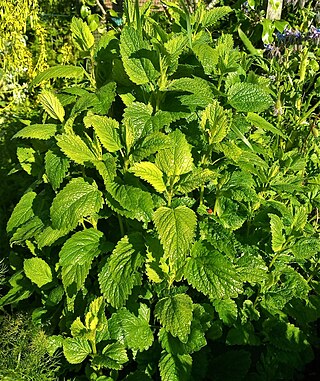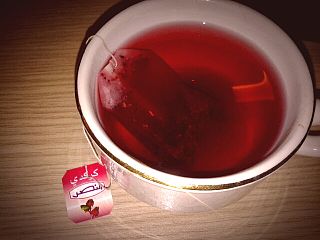Related Research Articles
Abortion is the termination of a pregnancy by removal or expulsion of an embryo or fetus. An abortion that occurs without intervention is known as a miscarriage or "spontaneous abortion"; these occur in approximately 30% to 40% of all pregnancies. When deliberate steps are taken to end a pregnancy, it is called an induced abortion, or less frequently "induced miscarriage". The unmodified word abortion generally refers to an induced abortion. The most common reasons women give for having an abortion are for birth-timing and limiting family size. Other reasons reported include maternal health, an inability to afford a child, domestic violence, lack of support, feeling they are too young, wishing to complete education or advance a career, and not being able or willing to raise a child conceived as a result of rape or incest.

Lemon balm is a perennial herbaceous plant in the mint family and native to south-central Europe, the Mediterranean Basin, Iran, and Central Asia, but now naturalised elsewhere.

An abortifacient is a substance that induces abortion. This is a nonspecific term which may refer to any number of substances or medications, ranging from herbs to prescription medications.

Chinese herbology is the theory of traditional Chinese herbal therapy, which accounts for the majority of treatments in traditional Chinese medicine (TCM). A Nature editorial described TCM as "fraught with pseudoscience", and said that the most obvious reason why it has not delivered many cures is that the majority of its treatments have no logical mechanism of action.

Herbal medicine is the study of pharmacognosy and the use of medicinal plants, which are a basis of traditional medicine. With worldwide research into pharmacology, some herbal medicines have been translated into modern remedies, such as the anti-malarial group of drugs called artemisinin isolated from Artemisia annua, a herb that was known in Chinese medicine to treat fever. There is limited scientific evidence for the safety and efficacy of many plants used in 21st-century herbalism, which generally does not provide standards for purity or dosage. The scope of herbal medicine sometimes include fungal and bee products, as well as minerals, shells and certain animal parts.
Self-medication, sometime called do-it-yourself (DIY) medicine, is a human behavior in which an individual uses a substance or any exogenous influence to self-administer treatment for physical or psychological conditions, for example headaches or fatigue.

Medicinal plants, also called medicinal herbs, have been discovered and used in traditional medicine practices since prehistoric times. Plants synthesize hundreds of chemical compounds for various functions, including defense and protection against insects, fungi, diseases, and herbivorous mammals.

Traditional Korean medicine refers to the forms of traditional medicine practiced in Korea.
An oneirogen, from the Greek ὄνειρος óneiros meaning "dream" and gen "to create", is a substance or other stimulus which produces or enhances dreamlike states of consciousness. This is characterized by an immersive dream state similar to REM sleep, which can range from realistic to alien or abstract.

A self-induced abortion is an abortion performed by the pregnant woman herself, or with the help of other, non-medical assistance. Although the term includes abortions induced outside of a clinical setting with legal, sometimes over-the-counter medication, it also refers to efforts to terminate a pregnancy through alternative, potentially more dangerous methods. Such practices may present a threat to the health of women.
Ethnomedicine is a study or comparison of the traditional medicine based on bioactive compounds in plants and animals and practiced by various ethnic groups, especially those with little access to western medicines, e.g., indigenous peoples. The word ethnomedicine is sometimes used as a synonym for traditional medicine.

Hibiscus tea is a herbal tea made as an infusion from crimson or deep magenta-colored calyces (sepals) of the roselle flower. It is consumed both hot and cold. It has a tart, cranberry-like flavor.

Abortion in South Africa is legal by request when the pregnancy is under 13 weeks. It is also legal to terminate a pregnancy between week 13 and week 20 under the following conditions: the continued pregnancy would significantly affect the pregnant person's social or economic circumstances, the continued pregnancy poses a risk of injury to the pregnant person's physical or mental health, there is a substantial risk that the foetus would suffer from a severe physical or mental abnormality, or the pregnancy resulted from rape or incest. If the pregnancy is more than 20 weeks, a termination is legal if the foetus' life is in danger, or there is a likelihood of serious birth defects.

Rotheca myricoides is a species of flowering plant in the family Lamiaceae. It is native to Africa and widely cultivated elsewhere. In cultivation, it is frequently known by one of its synonyms, such as Clerodendrum myricoides.

Fisetin (7,3′,4′-flavon-3-ol) is a plant flavonol from the flavonoid group of polyphenols. It can be found in many plants, where it serves as a yellow/ochre colouring agent. It is also found in many fruits and vegetables, such as strawberries, apples, persimmons, onions and cucumbers. Its chemical formula was first described by Austrian chemist Josef Herzig in 1891.

Traditional African medicine is a range of traditional medicine disciplines involving indigenous herbalism and African spirituality, typically including diviners, midwives, and herbalists. Practitioners of traditional African medicine claim, largely without evidence, to be able to cure a variety of diverse conditions including cancer, psychiatric disorders, high blood pressure, cholera, most venereal diseases, epilepsy, asthma, eczema, fever, anxiety, depression, benign prostatic hyperplasia, urinary tract infections, gout, and healing of wounds and burns and Ebola.

Abortion in Kenya is prohibited with the exception of certain circumstances including danger to the life and health of the expectant mother, and rape. Unsafe abortions are a major cause of deaths and health complications for women in Kenya.
Professor Paul Waako, is a Ugandan pharmacologist, academic and academic administrator, who serves as the Vice Chancellor of Busitema University, a public university in the Eastern Region of Uganda, since 1 May 2019.
Izifozonke is a commercial herbal mixture used in South African traditional medicine. It has been used by consumers seeking HIV treatment and self-induced abortions. It is categorized as a "general tonic," and the potion's tagline is "amazing mixture for all diseases". Other commercial herbal preparations sold in South African markets include Tokoloshe salts, Tshepe, Impotex forte, Sex sugar, and Fire-BarkTea, a product made of Bangalala root and marketed to men.
References
- ↑ Ndhlala, A.R.; Anthonissen, R.; Stafford, G.I.; Finnie, J.F.; Verschaeve, L.; Van Staden, J. (January 2010). "In vitro cytotoxic and mutagenic evaluation of thirteen commercial herbal mixtures sold in KwaZulu-Natal, South Africa". South African Journal of Botany. 76 (1): 132–138. doi: 10.1016/j.sajb.2009.09.010 .
- ↑ Mothibe, Mmamosheledi Elsie; Kahler-Venter, Christinah; Osuch, Elzbieta (2017-03-01). "In Vitro Effects of a Commercial Herbal Medicine Used as African Traditional Medicine on Human Neutrophils". African Journal of Traditional, Complementary and Alternative Medicines. 14 (3): 51–60. doi:10.21010/ajtcam.v14i3.6. ISSN 2505-0044. PMC 5412238 . PMID 28480416.
- ↑ Gerdts, Caitlin; Raifman, Sarah; Daskilewicz, Kristen; Momberg, Mariette; Roberts, Sarah; Harries, Jane (December 2017). "Women's experiences seeking informal sector abortion services in Cape Town, South Africa: a descriptive study". BMC Women's Health. 17 (1): 95. doi: 10.1186/s12905-017-0443-6 . ISSN 1472-6874. PMC 5625615 . PMID 28969631.
- ↑ Schmidt, Barbara M.; Cheng, Diana M. Klaser (2017-07-25). Ethnobotany: A Phytochemical Perspective. John Wiley & Sons. p. 171. ISBN 978-1-118-96191-9.